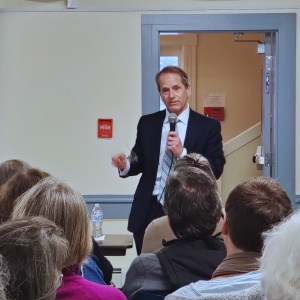ConVal grad Nicole Waite returns from sixth trip to Antarctica
| Published: 03-07-2023 2:53 PM |
Nicole Waite has been studying marine biology since she was a student at ConVal High School. She participated on the school’s Ocean Bowl team and went on to study marine biology in college.
Now she has a master’s degree in oceanography and just returned from her sixth trip to Antarctica.
Waite studies phytoplankton, microscopic ocean-dwelling organisms that contain chlorophyll, which allows them to photosynthesize – using the sun’s energy and carbon dioxide found in their environment to grow and releasing oxygen as a byproduct. Waite said phytoplankton are like “plants of the ocean,” as plants use photosynthesis to grow on land. Phytoplankton are at the bottom of the food chain and affect the rest of the ecosystem.
Waite recently returned from an annual research cruise that runs in January and February, which is summertime in Antarctica. She said it can be 30 to 35 degrees Fahrenheit there in January, similar to New Hampshire winter, but it stays light almost the entire 24-hour day. On the cruise, Waite was living and working from a ship, collecting samples and taking ocean measurements. She is part of a research project looking at data about phytoplankton, including shifts in the kinds and numbers of phytoplankton collected year to year. Waite said they have data that goes back to the 1990s, and they are seeing a trend from finding predominantly larger phytoplankton to finding an increase in smaller diatoms.
In particular, “We have seen a shift towards smaller cells in the northern peninsula where there’s more warming,” Waite said.
Researchers don’t know for certain why they are seeing this trend, but they have ideas about why it could be happening. Waite explained that with a warming climate there is more melting. When ice melts, there is more fresh water and smaller phytoplankton species could be more tolerant of fresh water than larger species.
Factors such as wind could also affect their data. This year, Waite said it was very windy, and they also found fewer phytoplankton. They’re not yet sure if it is related to climate change.
“We hypothesize that when you have less phytoplankton or different types, that will affect zooplankton,” Waite said. Zooplankton, such as krill, eat phytoplankton and are in turn are eaten by fish, penguins, birds and whales.
Article continues after...
Yesterday's Most Read Articles
 Peterborough voters approve a $11.7 million bond to fund a new Fire and Rescue Station
Peterborough voters approve a $11.7 million bond to fund a new Fire and Rescue Station
 ConVal’s Kimberly Rizzo Saunders named Superintendent of the Year
ConVal’s Kimberly Rizzo Saunders named Superintendent of the Year
 Reality Check receives approval to move into Redeeming Grace Church
Reality Check receives approval to move into Redeeming Grace Church
 Frank Edelblut speaks at Dublin Education Advisory Committee forum
Frank Edelblut speaks at Dublin Education Advisory Committee forum
 New look at Gregg Lake
New look at Gregg Lake
The problem with smaller phytoplankton, Waite explained, is that krill appear to prefer larger phytoplankton, while gelatinous zooplankton salps seem to prefer smaller species, and penguins and whales prefer krill over salps. Since 2014, when she took her first trip to the southern-most continent, she’s seen dramatic changes.
During the trips when Waite isn’t on a research cruise, she has lived at Palmer Station, a U.S. research base on Anvers Island. She has noticed the glacier near the station receding, exposing rock.
“I can see ice isn’t blue, solid anymore,” Waite said.
She can also see and hear water melting.
“I don’t remember ever seeing or hearing that my first year,” she said.
In the harbor, there’s now a small island that wasn’t there the first year Waite was in Antarctica. The glacier had receded enough to expose it. And on the glacial continent, she has noticed moss growing in some places. There have also been changes in species of penguins, more chinstrap and a decline in Adélie. This year, scientists recorded the lowest sea ice level ever recorded in Antarctica, beating the previous record set in 2022.
“It does make me depressed. It makes me sad every time I go down. I think there’s always room for hope,” said Waite, but she thinks some changes will be permanent. “You can’t regrow a glacier.”
Antarctica has become another home for Waite, and she misses it when she’s not there.
“What I miss most is the community,” she said.
Working and living with people for months at a time inevitably creates strong bonds, and when she returns to the United States, she said it’s an adjustment. Waite explained it’s weird to come back and be around cars and traffic.
Waite works full-time at Rutgers School of Environmental and Biological Sciences in New Jersey. She analyzes samples and data, writes research papers and plans for her next trip to Antarctica. She also works with the Center of Ocean Observing Leadership, where she runs a fleet of autonomous underwater vehicles that can take measurements and travel around the ocean at different depths.
“We deploy these for all kinds of research projects,” she said.
Waite runs a blog about her Antarctic travels where she shares some of her research, stories and photos. It can be found at adventuresoftwina.wordpress.com.
]]>


